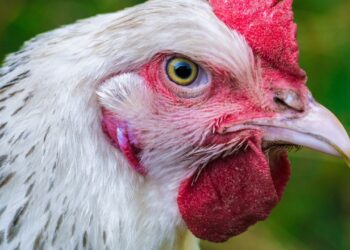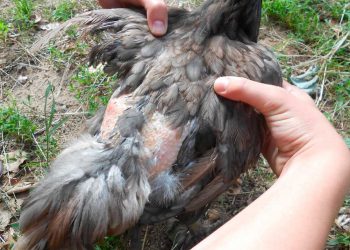The advantage of keeping hens is that you can enjoy your own tasty eggs. But it can happen that a hen suddenly stops laying eggs. There can be various reasons for this, which are not always easy to identify. A laying stop can be a natural and normal phenomenon,
for example, because the chicken is too old, is molting, or is broody. But there can also be other issues, such as a chicken disease, laying shortage, or too much stress. It is important that something can be done about most causes.
Egg production
At birth, a hen is given a certain number of eggs that determine the maximum amount of eggs she will lay in her life. Depending on the breed, really good layers will lay a lot of eggs in the beginning and then will not lay anything at a later age. Other breeds will again lay a moderate amount of eggs, but then continue to lay longer.
The maximum number of eggs a hen can lay is one every twenty-five hours. This is because it takes twenty-five hours for an egg to be ready to be laid. Egg production can be disrupted in a hen for various reasons. As a result, it can happen that a hen (temporarily) does not lay eggs.
feed
Hens that are deficient in certain nutrients can lay fewer or no eggs. Chickens that are too fat can also have a disturbed laying. It is important that the feed is not too fatty and that the hens have sufficient grit, stomach grit, and occasionally green food and fruit.
Feeding too much grain can cause chickens to become overweight and stop laying. Feeding with laying pellets should in principle be sufficient. Stomach gravel can help digest the food and grit is needed for extra calcium to make the eggshells. Chickens can also get calcium from calcareous greens such as grass and clover.
season
As the days get shorter, chickens can lay fewer eggs. This is not because it is getting colder, but because the chickens get less daylight. As a result, hens may suddenly start laying again after a snow shower because the snow reflects the light. However, some varieties also pass through the winter.
Reading suggestions; Taking care of chickens chicks
Laying during a winter period can be promoted by installing artificial light in the loft. The chickens will then probably also lay eggs during the dark days.
Rustic
A hen that is molting usually lays no or fewer eggs. The construction of new springs costs a lot of energy and lime, which means that egg production can be put on the back burner. Supplementing with protein-rich food and extra calcium can speed up the molting period.
The molting period is annual and usually in the autumn, but can sometimes also fall in the spring. If a chicken is molting in a different period, it may be due to a disease.
broody
Broody hens will not lay eggs. Some breeds go broody quickly, while other breeds hardly go broody. The chance that a hen will go broody is greater if the outside temperature is higher because higher temperatures affect the production of certain hormones. Leaving eggs can also promote broodiness.
Finally, broody hens can copy each other’s behavior, allowing one broody hen to infect the other. If a hen is undesirably broody, there are several ways to get the hen to go broody.
Age
Chicks and young hens do not yet lay eggs, but too old hens can stop laying eggs. Hens don’t start laying eggs until around six months old. A pullet may also wait until spring to lay her first egg, which means the hen may be well over six months old before laying her first egg.
The hens will lay an egg regularly in the period of about six months to four years. After four years laying can become much less and some breeds only lay eggs sporadically.
stress
A stressed hen may temporarily stop laying eggs. Chickens can be stressed for a variety of reasons. For example, by moving the coop, by adding strange chickens, or because they are stuck somewhere. Sometimes it can take some time before the chickens have calmed down and start laying eggs.
For example, after a move, it can sometimes take up to six weeks before the chickens are used to their new living environment and start laying eggs again.
chicken disease
Chickens that are sick will often have reduced egg production. The hen will put her energy into recovering from the disease instead of laying eggs. Sick chickens can be recognized by abnormal behavior or disease symptoms. Hens that no longer forage and remain in one place can be sick.
Even if they lose weight, have loose stools, feathers fall out, or put up their legs, the chickens can have something under the members.
Laying eggs Need
In the case of laying-egg, the hen literally cannot lose her egg. This may be because the shape of the egg is abnormal or too large. But laying shortage can also be caused by a calcium deficiency, being overweight, or not finding a good nest. Because the hen cannot get rid of the egg, inflammation can occur. A hen with laying distress should therefore always be helped.
Reading suggestions; Chicken Feed: 3 Things You Need To Know About Feeding Chickens
This can be done by keeping the hen at a temperature of around 30 degrees, which makes it easier for the egg to come out. For example, place the hen in a bowl of warm water. It can also help to lubricate the cloaca with oil. If the laying shortage is caused by a lack of lime, feeding chicken grit and calcareous green feed can suffice.
rooster roll
Some hens take over the role of a rooster when it is not there. The hens may become more aggressive, start crowing, and possibly stop laying eggs. The solution is to put a rooster next to the hens. In most cases, the rooster behavior in the hen will disappear.








